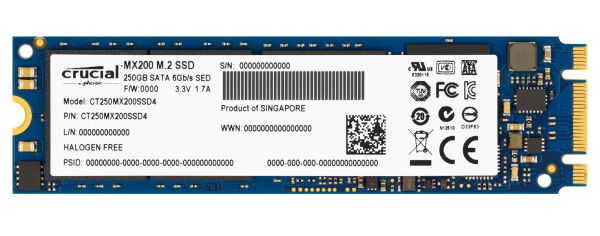Our final drive in this group is the Crucial MX200 250GB M.2 SSD. Following the standard SSDs and mSATA drives of the MX200 range, the M.2 version doesn’t differ all that much in terms of the specifications, other than the physical dimensions and the final benchmarks.
This is a standard sized M.2 SATA-3 6Gbps device, measuring 22 x 80 x 2.2mm and weighing 7g. The power consumption is 0.2W when idle, 1W average, 3W maximum when reading and 4W maximum when writing. Crucial rates the lifespan of the MX200 at 1.5 million hours.
There's a long list of features that accompany the MX200, inherited from the rest of the product line, no doubt. You’ll get Dynamic Write Acceleration, Redundant Array of Independent NAND support, Data Defence, Adaptive Thermal Protection, Power Loss Protection and Active Garbage Collection. On top of that lot, there’s also the usual TRIM support, S.M.A.R.T. and error correction.
Most of the technology in those features is much the same as the other models we’ve reviewed: different abbreviations and names, but essentially all doing the same thing. Again, though, unless you’re planning on using several Crucial MX200s in a RAID (or, to be more accurate, RAIN) array, then you’ll hardly notice the features at work.
The ATTO benchmark came back with some intriguing, if a little confusing, numbers. To begin with, the 8192KB transfer test recorded a read speed of 563MB/s (equal to both the Patriot and Transcend M.2 drives), while the write speed proved to be 513MB/s – around the same as the Samsung model.
The 4KB tests, though, didn’t fare quite as well. The read speed was recorded at a rather poor 135MB/s and the write speed a mere 106MB/s. We’re not sure why the lower transfer rates proved to be a bit of a chore for the MX200, because it’s otherwise a perfectly good and decent performing M.2 SSD. Those numbers are the lowest here and could very well end up being a deciding factor for some users.
Nevertheless, we didn’t notice any huge difference in the booting of Windows 10 (although it did take perhaps a couple of seconds more to boot from the BIOS) and the running of programs and games. 250GB is a good amount to keep most average users happy for a while, although you'll eventually need to either upgrade or factor in a second, larger capacity drive at some point in the near future.
At around £75, the Crucial MX200 250GB M.2 SSD is pretty good value for money. It’s cheaper than the similar capacity models we’ve looked at here, but considering the poorer small file size transfers, it might be worth considering spending £20 or so more and opting instead for either the Kingston or the Transcend model.
